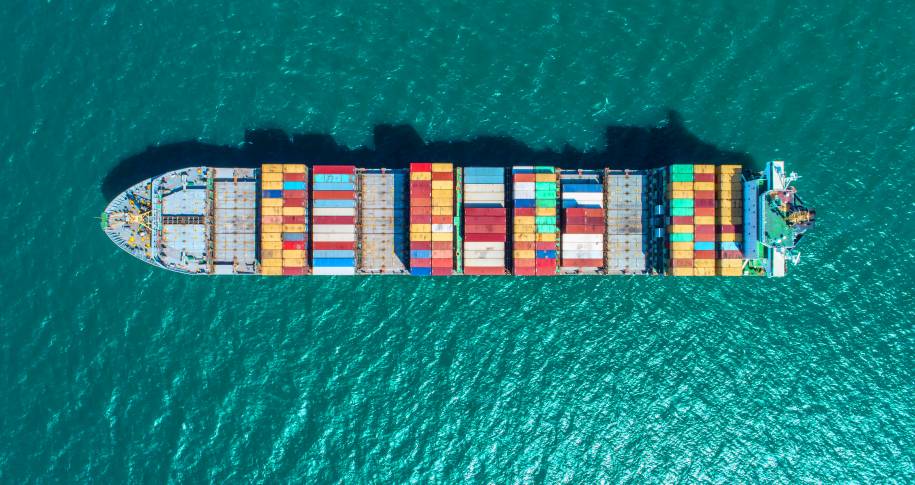It’s difficult to grasp the magnitude of the container shipping industry unless you’re directly involved. At any one time there can be 33 million containers, each measuring 20 x 20 feet, aboard upwards of 50,000 vast shipping vessels, some the size of four football pitches!
These vessels drift around the globe, barely making a dent in the Earth’s immense oceans. But while the fate of an individual container may seem a drop in the ocean, the logistics of successfully transporting them is a complex task that doesn’t come without risk – to the cargo itself and to the ocean it is travelling.
Global waterways
While the busiest shipping ports are mainly in Asia, the world’s oceans at large are bustling with cargo. In fact, the Strait of Dover is the world’s busiest international seaway, while 20 per cent of the globe’s petroleum passes through the Strait of Hormuz between the Persian Gulf and Oman.
Businesses around the globe are supported by shipping containers, which transport goods and resources, home-grown and manufactured products across oceans to where they need to be.
A BBC experiment to investigate the extent of container shipping tracked a single container for nine months, during which time it travelled as far and wide as Los Angeles, Yokohama, Brazil, Southampton and Hong Kong, transporting loads as diverse as cat food, whisky, ink and monosodium glutamate!
A risky business
But what if a container ship is struck and starts to sink or runs aground, single containers might drift away or toxic loads start to leak? These crisis-level incidents are fortunately rare although estimates suggest between four and thirty containers on average can be ‘lost’ to the waves every single day. In 2011 the World Shipping Council claimed that more than 50 containers can be involved in one single incident of “catastrophic loss” due to severe weather conditions, rough seas, ship grounding or collision.
Some containers are bobbing their way into environmental analysis reports, helping scientists chart the trends and progress of these lost loads. Oceanographer Curtis Ebbesmeyer used this technique to map the globe’s currents using a cargo of marooned rubber ducks and a similar study is charting the mixed fortunes of 61,000 Nike trainers lost overboard!
Many containers simply sink without a trace although they may take two months to completely disappear, while others, buoyed by insulated refrigeration systems, may drift for longer or even until they find land.
Hidden dangers
One of the main dangers of losing containers is the hazard they pose as low-floating obstacles. Imagine the devastating impact if it is struck by a passing cruise ship, itself an immense craft but dwarfed by the giant platform from which the container would have fallen. And that’s not even considering the potential risk posed by the contents of that container. If it is transporting hazardous chemicals or pollutants, any spillage can massively damage the ocean’s fragile ecosystem.
In 2002 the MV Tricolour cargo ship was involved in such an incident in the English Channel when it collided with another ship, losing 2,862 BMW, Volvo and Saab motor cars as well as 77 units of tractor and crane parts. Two days later the devastation worsened as the stricken craft was hit by a vessel carrying 70,000 tonnes of hugely flammable gas oil. Then a third ship hit the Tricolour, knocking off a safety valve to trigger a potentially devastating oil spill. These events are incredibly rare but illustrate how an isolated incident can escalate at sea. The largest container ship in history, the Seawise Giant, required a full five miles to slow to a halt, demonstrating the magnitude and potential for devastation that comes with this global industry.
Calm despite the storm
Whether a cargo of manufacturing materials or precious goods, the value of these loads is priceless when you consider the cost of their replacement plus the damage they are capable of. So it’s no surprise that adequate insurance is an essential component of global shipping logistics. Organisations like global removals specialist John Mason International are skilled at handling the complete logistics that enable corporations and individual customers to float their precious cargo with the peace of mind that they have safeguarded their goods against all eventualities.
Noel Briscoe, John Mason International’s chief operating officer says: “Whether you’re planning a domestic relocation or shipping valuable stock by sea there are several safeguards you must make to ensure its safe passage and arrival. From careful planning and packing to sufficient international removals insurance and marine cover, it pays to be well prepared when shipping precious cargo safely to its next chapter.”










